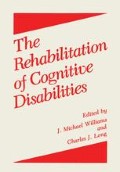Abstract
Cognitive retraining consists of a group of educational techniques ostensibly designed to remediate the impairments in cognition that result from brain injury (Diller & Gordon, 1981; Luria, 1963). For example, aphasia resulting from dominant hemisphere injury is treated using a wide array of language retraining techniques that vary with the type of aphasic symptoms (Darley, 1975). Similarly, memory disorder is treated using mnemonic techniques, such as visual mediation, or memory-assistive devices, like appointment books (Crovitz, 1979; Gianutsos, 1981; Schacter & Glisky, 1986).
Access this chapter
Tax calculation will be finalised at checkout
Purchases are for personal use only
Preview
Unable to display preview. Download preview PDF.
References
Anthony, W.A. (1980). Psychological rehabilitation: a concept in need of a method. American Psychologist, 32 ,658–662.
Anthony, W. A., Buell, G., Sharratt, S., & Althoff, M. (1972). The efficacy of psychiatric rehabilitation. Psychological Bulletin, 78 ,447–456.
Anthony, W. A., Cohen, M. R., & Vitalo, R. (1978). The measurement of rehabilitation outcome. Schizophrenia Bulletin, 4 ,365–383.
Binder, L.M., & Schreiber, J. (1980). Visual imagery and verbal mediation as memory aids in recovering alcoholics. Journal of Clinical Neuropsychology ,2, 71 -74.
Brinkman, S.D. (1979). Rehabilitation of the neurologically impaired patient: The contribution of the neuropsychologist. International Journal of Clinical Neuropsychology, 3, 39–44.
Caplan, B. (1982), Neuropsychology in rehabilitation: Its role in evaluation and intervention. Archives of Physical and Medical Rehabilitation, 63, 362–366.
Crovitz, H.F. (1979). Memory retraining in brain damaged patients: The airplane list. Cortex, 15, 131–134.
Darley, F. L. (1975). Treatment of acquired aphasia. In W. J. Friedlander (Ed), Advances in Neurology. New York: Raven.
DeJong, G., & Hughes, J. (1982). Independent Living: Methodology for measuring long term outcomes. Archives of Physical and Medical Rehabilitation, 63 ,68–73.
Diller, L. & Gordon, W.A. (1981). Rehabilitation and clinical neuropsychology. In: S. Filskov & T. Boll, (Eds.), Handbook of Clinical Neuropsychology ,New York: Wiley.
Gianutsos, R. (1981). Training the short and long term verbal recall of a postencephalitic amnesic. Journal of Clinical and Experimental Neuropsychology, 3 ,143–153
Godfrey, H.P.D., & Knight, R.G. (1985). Cognitive rehabilitation of memory functioning in amnesic alcoholics. Journal of Consulting and Clinical Psychology, 53 ,555–557.
Heaton, R. K. & Pendelton, M. G. (1981). Use of neuropsychological tests to predict adult patient’s everyday functioning. Journal of Consulting and Clinical Psychology, 49 ,807–821.
Jellineck, H.M., Torkelson, R.M., & Harvey, R.F. (1982) Functional abilities and distress levels in brain injured patients at long-term follow-up. Archives of Physical and Medical Rehabilitation, 63 , 160–162.
Jones, M.K. (1974). Imagery as a mnemonic aid after left temporal lobectomy: Contrast between material-specific and generalized memory disorders. Neuropsychologia, 12 ,21–30.
Lawson, I.R. (1962). Visual-spatial neglect in lesions of the right cerebral hemisphere. Neurology, 12 , 23–33.
Lawton, M.P., & Brody, E. (1969). Assessment of older people: Self-maintaining and instrumental activities of daily living. Gerontologist, 9 ,179–186.
Luria, A. (1963). Restoration of Function after Brain Injury. New York: MacMillan.
McNair, D.M., & Kahn, R.J. (1983). Self assessment of cognitive deficits. In: T. Crook, S. Ferris, & R. Bartus (Eds.), Assessment in Geriatric Psychopharmacology ,(pp. 137–143). New Canaan, Conn: Mark Powley Associates.
Prigatano, G. P., et al. (1985). Neuropsychological rehabilitation after brain injury ,Baltimore: The Johns Hopkins University Press.
Sbordone, R. (1984). Rehabilitative Neuropsychological approach for severe traumatic brain-injured patients. Professional Psychology: Research and Practice, 15 ,165–175.
Schacter, D.L., & Glisky, EX. (1986). Memory remediation: Restoration, alleviation, and the acquisition of domain-specific knowledge. In B.P. Uzzell & Y. Gross (Eds.), Clinical Neuropsychology of Intervention. Boston: Martinus Nijhoff Publishing.
Williams, J. M. (1986). HORIZONS: An outpatient neurological retraining program. Unpublished manuscript, Memphis State University.
Williams, J. M. (1987). The brief and extended assessment of the elderly patient. In: L. Hartlage, P. Asken, & J. Hornsby (Eds), Essentials of Neuropsychological Assessment. New York: Springer.
Williams, J. M., Klein, K., & Davis, K. (in preparation). Prediction of premorbid IQ using family observations.
Williams, J. M., Klein, K., Little, M., & Haban, G. (1986). Family Observations of everyday cognitive impairment in dementia. Archives of Clinical Neuropsychology, 1 ,183–192.
Wilson, R.S., Rosenbaum, G., Brown, G., Rourke, D., Whitman, D., & Grisell, J. (1978). An index of premorbid intelligence. Journal of Consulting and Clinical Psychology, 46 ,1554–1555.
Woods, R.T. (1983). Specificity of learning in reality-orientation sessions: a single case study. Behavior Research and Therapy, 21 ,173–175.
Wright, G. N. (1980). Total Rehabilitation. Boston: Little, Brown & Co.
Editor information
Editors and Affiliations
Rights and permissions
Copyright information
© 1987 Plenum Press, New York
About this chapter
Cite this chapter
Williams, J.M. (1987). The Role of Cognitive Retraining in Comprehensive Rehabilitation. In: Williams, J.M., Long, C.J. (eds) The Rehabilitation of Cognitive Disabilities. Springer, Boston, MA. https://doi.org/10.1007/978-1-4613-1899-6_3
Download citation
DOI: https://doi.org/10.1007/978-1-4613-1899-6_3
Publisher Name: Springer, Boston, MA
Print ISBN: 978-1-4612-9057-5
Online ISBN: 978-1-4613-1899-6
eBook Packages: Springer Book Archive

